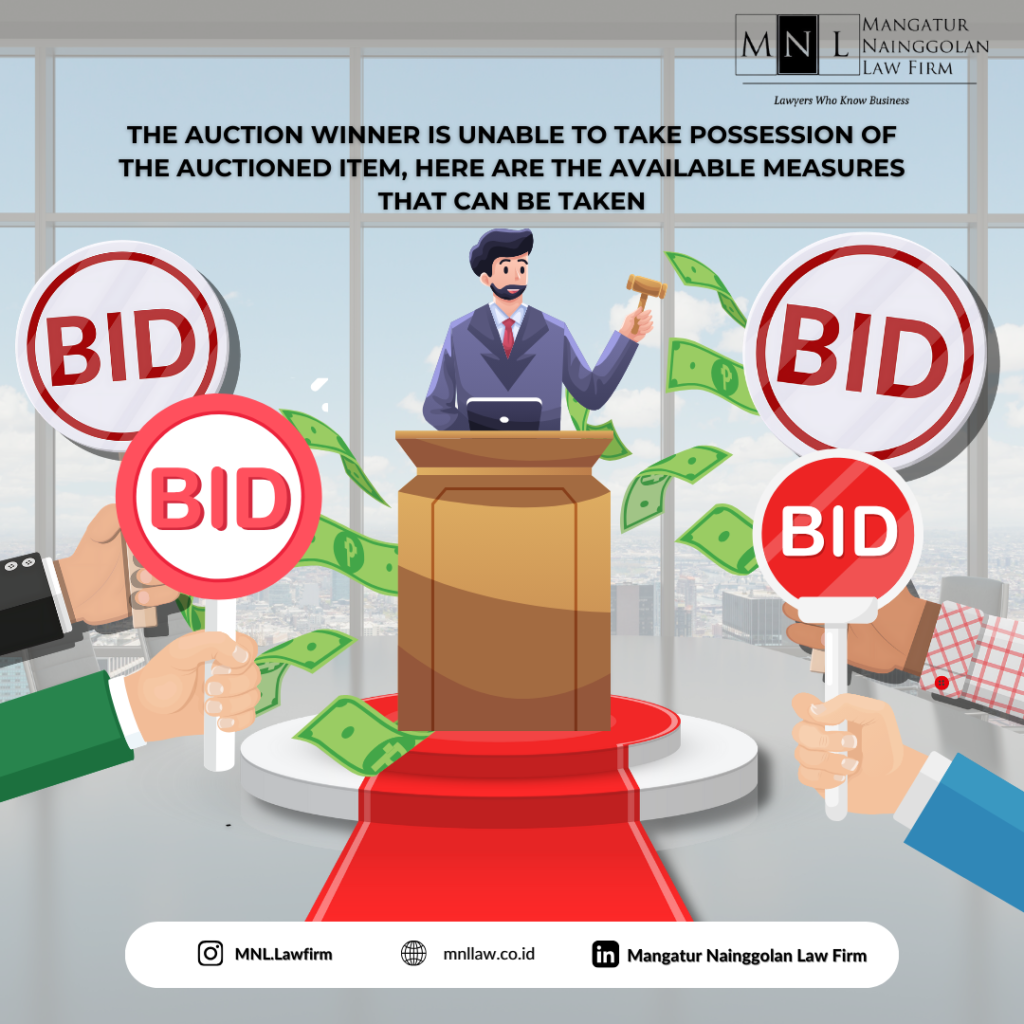
The definition of auction is stated in Article 1 number 1 of the Minister of Finance Regulation Number 213/PMK.06/2020 regarding the Implementation Guidelines for Auctions (“Auction PMK”), which is the sale of goods open to the public with written and/or oral bids that increase or decrease to reach the highest price, preceded by an Auction Announcement. The goods that can be auctioned consist of intangible, movable, or immovable property, consumable or non-consumable, which can be traded, used, utilized, enjoyed, and have economic value.
The auction buyer shall fulfill the auction payment obligations as stipulated in Article 1 number 29 in conjunction with Article 24 of the Auction PMK.
Article 1, point 29 of the Auction PMK
“The Auction Payment Obligation is the price to be paid by the Buyer in the implementation of the auction, which includes the Auction Principal and Buyer’s Auction Fee.“
Article 24 of the Auction PMK
“The Buyer is prohibited from taking or possessing the purchased goods before fulfilling the Auction Payment Obligation and other legitimate obligations as stipulated by the laws and regulations.”
The auction buyer may settle the auction payment obligations according to the method regulated in Article 80 paragraph (4) and (5) of the Auction PMK.
Article 80, paragraph (4) of the Auction PMK
“The settlement of the Auction Payment Obligation is carried out by the Buyer through the account of the State Treasury Regional Office (KPKNL) or Auction House or a special account under the name of the Second Class Auctioneer Official or directly to the Auction House or Second Class Auctioneer Official.”
Article 80, paragraph (5) of the Auction PMK
“Every settlement of the Auction Payment Obligation by the Buyer must be provided with a receipt or proof of payment by the Treasury Receiver or the Head of the Auction House or the Second Class Auctioneer Official.”
If the auctioned item consists of land and/or buildings, the Auction Winner must also pay the Land and Building Acquisition Duty (BPHTB).
After all Auction Payment Obligations are fulfilled, the Auction Winner is entitled to receive the Auction Report Extract which contains the minutes of the auction proceedings prepared by the Auction Official. This Auction Report Extract serves as the deed of sale/purchase/Auction Report Extract Grosse. The Auction Winner may collect the goods and/or ownership documents of the goods by presenting the payment receipt/evidence and the Auction Report Extract to the Seller/Auction Official, as regulated in Article 83 of the Auction PMK. Thus, the Auction Winner can carry out the transfer of ownership of the auctioned object (change of name) to protect the auctioned object that has been won.
However, even though the Auction Winner has fulfilled their obligations and the object has been transferred into their name, often the Auction Winner is unable to physically possess the auctioned object they have won. This commonly occurs with auctioned objects such as land and/or buildings where others still claim interests in the said land and/or buildings. This has the potential to infringe upon the rights of the Auction Winner as they are unable to possess the land and/or buildings they have purchased through the official auction institution of the State Asset and Auction Service Office (“KPKNL”), which they as buyers should be protected as per the Supreme Court Decision No. 1068K/PDT/2008 dated January 21, 2009 in the Supreme Court Annual Meeting of 2011.
“That auction buyers of disputed objects based on the Auction Report and Auction Summary, which are based on legally binding decisions, are buyers of good faith and therefore must be protected.”
“That if in the future there is a decision that contradicts the legally binding decision and declares that the legally binding decision is not binding, then that decision cannot be used as a reason to cancel the auction (let alone request for seizure or blockage), what can be done is to demand compensation for the disputed object from the Auction Applicant.”
In the event of obstacles in obtaining physical possession of the auctioned object won, the Auction Winner may pursue either the litigation route or the non-litigation route.
- LITIGATION
The Auction Winner may file an application to the district court for eviction to be carried out, in accordance with the provisions of Article 218 paragraph (2) of the Code of Civil Procedure which states:
“If the losing party refuses to vacate the immovable property that has been sold, then the Chief Judge of the District Court or a Magistrate empowered for this purpose shall issue an order to an authorized officer to enforce the eviction, if necessary with the assistance of the police. The property shall be vacated and cleared by the party being evicted together with all persons accompanying them and all their belongings.”
- NON-LITIGATION
The Auction Winner may engage in mediation or negotiation with the party still occupying/controlling the auctioned object they have won to assert their right to physical possession of the auctioned object.
If you require Legal Consultation, you can contact us through:
Email: Secretary@mnllaw.co.id
Phone: 0812 9539 7825 / 0813 98941976
